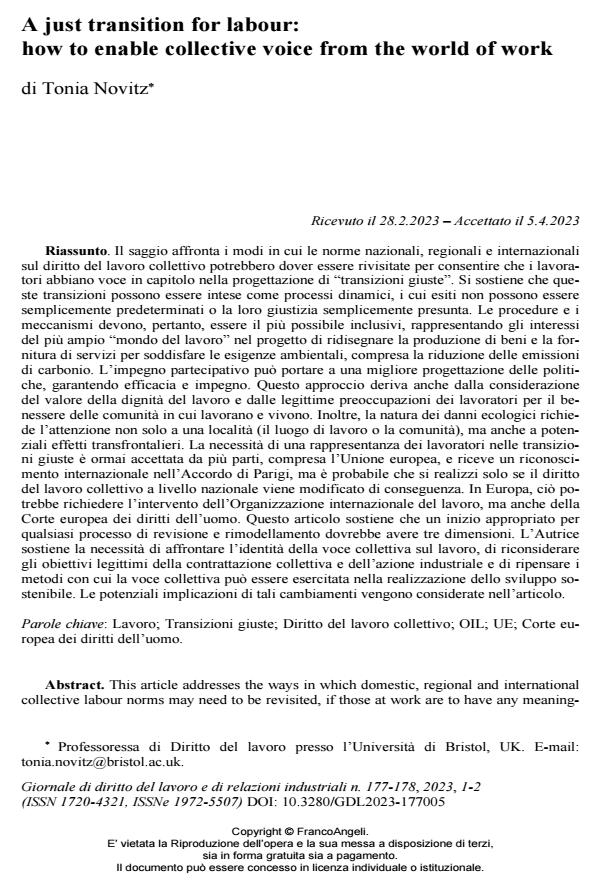A just transition for labour: how to enable collective voice from the world of work
Titolo Rivista GIORNALE DI DIRITTO DEL LAVORO E DI RELAZIONI INDUSTRIALI
Autori/Curatori Tonia Novitz
Anno di pubblicazione 2023 Fascicolo 2023/177-178
Lingua Inglese Numero pagine 19 P. 55-73 Dimensione file 256 KB
DOI 10.3280/GDL2023-177005
Il DOI è il codice a barre della proprietà intellettuale: per saperne di più
clicca qui
Qui sotto puoi vedere in anteprima la prima pagina di questo articolo.
Se questo articolo ti interessa, lo puoi acquistare (e scaricare in formato pdf) seguendo le facili indicazioni per acquistare il download credit. Acquista Download Credits per scaricare questo Articolo in formato PDF

FrancoAngeli è membro della Publishers International Linking Association, Inc (PILA), associazione indipendente e non profit per facilitare (attraverso i servizi tecnologici implementati da CrossRef.org) l’accesso degli studiosi ai contenuti digitali nelle pubblicazioni professionali e scientifiche.
This article addresses the ways in which domestic, regional and international collective labour norms may need to be revisited, if those at work are to have any meaningful voice in the design of "just transitions". It is argued that these transitions can be understood as dynamic pro-cesses, the outcomes of which cannot be simply pre-determined or their justice merely as-sumed. It therefore makes sense for associated procedures and mechanisms to be as inclusive as possible, representing interests of the wider “world of work” in the project of recrafting the manufacture of goods and delivery of services to meet environmental needs, including the re-duction of carbon emissions. Participatory engagement is likely to lead to better policy design, ensuring effectiveness and commitment. This approach also follows from appreciation of the dignity of labour and the legitimate concerns of those at work with the welfare of the commu-nities in which they work and live. Moreover, the nature of ecological harms require attention to not merely one locality (the workplace or the community) but potential for transborder ef-fects. The case for labour representation in just transitions is now accepted in many quarters, including the European Union (EU), and receives international recognition in the Paris Agreement, but is only likely to be realisable if national level collective labour law is changed accordingly. In Europe, that may require prompts from the International Labour Organization (ILO), but also the European Court of Human Rights. This article argues that an appropriate beginning for any process of revision and remodelling would have three dimensions. Firstly, I advocate addressing the identity of collective voice at work, reconsidering the legitimate objec-tives of collective bargaining and industrial action, and rethinking the methods by which col-lective voice can be exercised in the realisation of sustainable development. The potential im-plications of such changes are considered here.
Il saggio affronta i modi in cui le norme nazionali, regionali e internazionali sul diritto del lavo-ro collettivo potrebbero dover essere rivisitate per consentire che i lavoratori abbiano voce in capitolo nella progettazione di "transizioni giuste". Si sostiene che queste transizioni possono essere intese come processi dinamici, i cui esiti non possono essere semplicemente predeter-minati o la loro giustizia semplicemente presunta. Le procedure e i meccanismi devono, pertan-to, essere il più possibile inclusivi, rappresentando gli interessi del più ampio "mondo del lavoro" nel progetto di ridisegnare la produzione di beni e la fornitura di servizi per soddisfare le esigenze ambientali, compresa la riduzione delle emissioni di carbonio. L’impegno partecipati-vo può portare a una migliore progettazione delle politiche, garantendo efficacia e impegno. Questo approccio deriva anche dalla considerazione del valore della dignità del lavoro e dalle legittime preoccupazioni dei lavoratori per il benessere delle comunità in cui lavorano e vivono. Inoltre, la natura dei danni ecologici richiede l’attenzione non solo a una località (il luogo di lavoro o la comunità), ma anche a potenziali effetti transfrontalieri. La necessità di una rappre-sentanza dei lavoratori nelle transizioni giuste è ormai accettata da più parti, compresa l’Unione europea, e riceve un riconoscimento internazionale nell’Accordo di Parigi, ma è probabile che si realizzi solo se il diritto del lavoro collettivo a livello nazionale viene modificato di conse-guenza. In Europa, ciò potrebbe richiedere l’intervento dell’Organizzazione internazionale del lavoro, ma anche della Corte europea dei diritti dell’uomo. Questo articolo sostiene che un ini-zio appropriato per qualsiasi processo di revisione e rimodellamento dovrebbe avere tre di-mensioni. L’Autrice sostiene la necessità di affrontare l’identità della voce collettiva sul lavoro, di riconsiderare gli obiettivi legittimi della contrattazione collettiva e dell’azione industriale e di ripensare i metodi con cui la voce collettiva può essere esercitata nella realizzazione dello svi-uppo sostenibile. Le potenziali implicazioni di tali cambiamenti vengono considerate nell’articolo.
Parole chiave:Lavoro; Transizioni giuste; Diritto del lavoro collettivo; OIL; UE; Corte europea dei diritti dell’uomo.
- Workers on the front line of climate change: Re-politicizing trade union climate action Ben CRAWFORD, David WHYTE, in International Labour Review /2025
DOI: 10.16995/ilr.18838 - Green Transition and the Quality of Work Edoardo Ales, pp.15 (ISBN:978-3-031-68199-8)
- Il contratto collettivo dei metalmeccanici nel sistema di relazioni industriali: intuizioni e innovazioni alla prova dei fatti Giulio Centamore, Andrea Lassandari, Federico Martelloni, Valeria Nuzzo, in GIORNALE DI DIRITTO DEL LAVORO E DI RELAZIONI INDUSTRIALI 180/2024 pp.593
DOI: 10.3280/GDL2023-180005 - Los trabajadores frente al cambio climático. Repolitización de la acción climática sindical Ben CRAWFORD, David WHYTE, in Revista Internacional del Trabajo /2025
DOI: 10.16995/ilrs.18838 - Impresa e transizione ecologica: alcuni profili lavoristici Valerio Speziale, in GIORNALE DI DIRITTO DEL LAVORO E DI RELAZIONI INDUSTRIALI 179/2023 pp.283
DOI: 10.3280/GDL2023-179001 - Les travailleurs en première ligne du changement climatique: repolitiser l’action syndicale pour le climat Ben CRAWFORD, David WHYTE, in Revue internationale du travail /2025
DOI: 10.16995/ilrf.18838
Tonia Novitz, A just transition for labour: how to enable collective voice from the world of work in "GIORNALE DI DIRITTO DEL LAVORO E DI RELAZIONI INDUSTRIALI " 177-178/2023, pp 55-73, DOI: 10.3280/GDL2023-177005